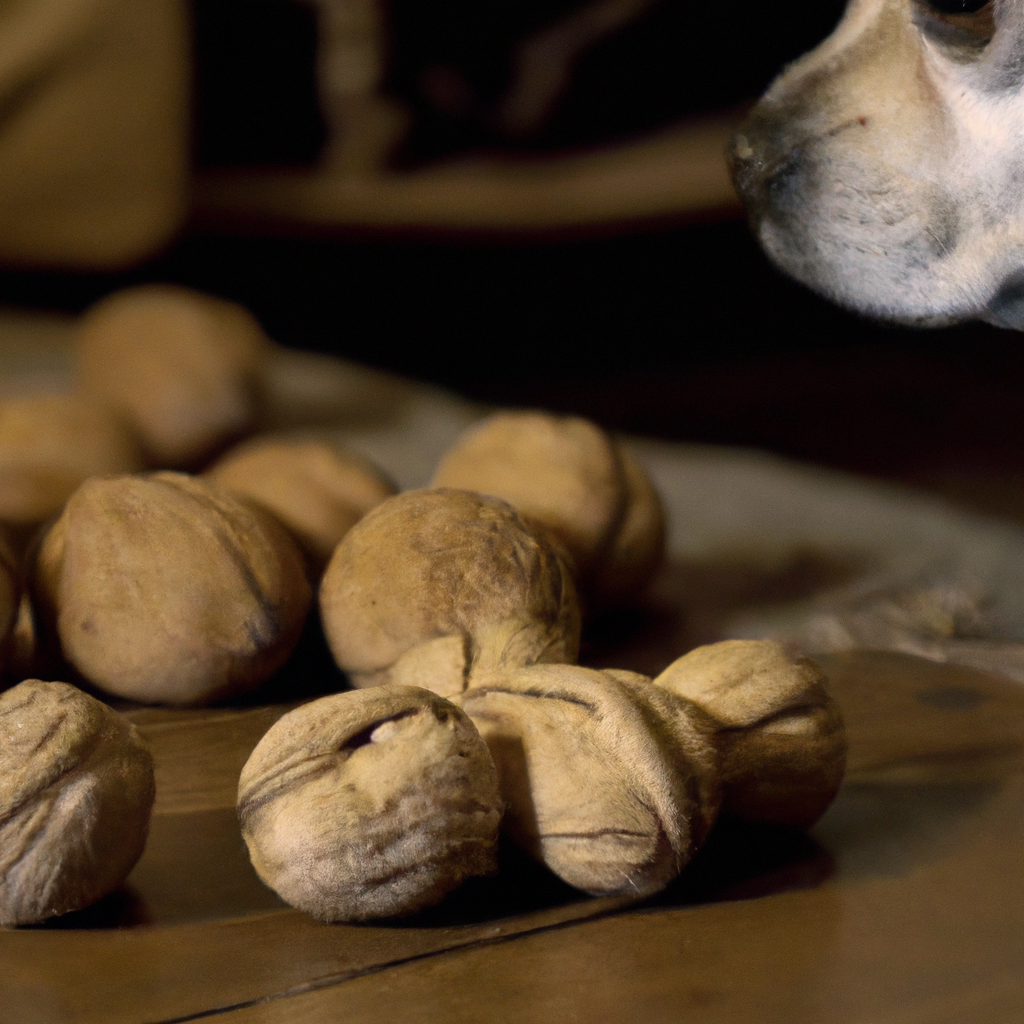Walnuts and Dogs: A Cautionary Tale.
Walnuts are a popular snack for humans, but can dogs eat them too? It’s important to know the answer to this question as some human foods can be harmful to dogs. In this article, we will discuss the compatibility of walnuts and dogs and what you need to know to keep your furry friend safe.
Benefits of Feeding Walnuts to Dogs
Walnuts and Dogs: What You Need to Know About Their Compatibility
As a dog owner, you want to ensure that your furry friend is healthy and happy. One way to achieve this is by feeding them a balanced diet that includes all the necessary nutrients. While there are many foods that are safe for dogs to eat, there are also some that can be harmful. Walnuts are one such food that has been the subject of much debate among pet owners. In this article, we will explore the benefits of feeding walnuts to dogs and what you need to know about their compatibility.
Walnuts are a rich source of nutrients that can benefit your dog’s health in many ways. They are high in protein, fiber, and healthy fats, which can help maintain your dog’s weight and keep them feeling full for longer. Walnuts also contain antioxidants, which can help protect your dog’s cells from damage caused by free radicals. Additionally, they are a good source of vitamins and minerals, including vitamin E, magnesium, and phosphorus.
Feeding your dog walnuts can also help improve their cognitive function. Studies have shown that walnuts contain omega-3 fatty acids, which are essential for brain health. These fatty acids can help improve memory and learning in dogs, making them more alert and responsive.
Another benefit of feeding walnuts to dogs is that they can help improve their immune system. Walnuts contain a compound called ellagic acid, which has been shown to have anti-inflammatory properties. This can help reduce inflammation in your dog’s body, which can lead to a stronger immune system and better overall health.
However, it is important to note that while walnuts can be beneficial for dogs, they should be fed in moderation. Too many walnuts can cause digestive issues, such as diarrhea and vomiting. Additionally, walnuts are high in fat, which can lead to weight gain if your dog eats too many of them. It is recommended that you feed your dog no more than one or two walnuts per day, depending on their size and weight.
It is also important to ensure that the walnuts you feed your dog are safe. Raw walnuts can contain a fungus called Aspergillus, which can be harmful to dogs. To avoid this, it is best to feed your dog roasted or cooked walnuts. Additionally, you should always remove the shell before feeding your dog walnuts, as the shell can be a choking hazard.
In conclusion, walnuts can be a healthy and beneficial addition to your dog’s diet. They are a rich source of nutrients that can help improve your dog’s cognitive function, immune system, and overall health. However, it is important to feed them in moderation and ensure that they are safe for your dog to eat. If you have any concerns about feeding your dog walnuts, it is best to consult with your veterinarian. With the right care and attention, you can ensure that your furry friend stays healthy and happy for years to come.
Risks of Feeding Walnuts to Dogs
Walnuts are a popular snack for humans, but can they be given to dogs? While walnuts are not toxic to dogs, they can pose some risks if consumed in large quantities or in certain forms.
One of the main risks of feeding walnuts to dogs is the potential for gastrointestinal upset. Walnuts are high in fat and can be difficult for dogs to digest, leading to vomiting, diarrhea, and other digestive issues. Additionally, the high fat content can also lead to pancreatitis, a serious condition that can cause inflammation of the pancreas and lead to organ damage.
Another risk of feeding walnuts to dogs is the potential for choking or intestinal blockages. Whole walnuts can be difficult for dogs to chew and swallow, and can become lodged in the throat or digestive tract. This can cause serious health problems and may require surgical intervention to remove the blockage.
In addition to these risks, some dogs may also be allergic to walnuts. Symptoms of a walnut allergy in dogs can include itching, hives, swelling, and difficulty breathing. If your dog shows any signs of an allergic reaction after consuming walnuts, it is important to seek veterinary care immediately.
It is also important to note that certain types of walnuts can be more dangerous for dogs than others. Black walnuts, for example, contain a toxin called juglone that can be harmful to dogs if ingested in large quantities. Symptoms of juglone toxicity in dogs can include vomiting, diarrhea, seizures, and even death in severe cases.
Overall, while walnuts are not toxic to dogs, they should be given in moderation and with caution. If you do choose to give your dog walnuts as a treat, it is important to ensure that they are shelled and chopped into small pieces to reduce the risk of choking or intestinal blockages. It is also important to monitor your dog closely for any signs of digestive upset or allergic reactions.
In addition to the risks associated with feeding walnuts to dogs, it is also important to consider the nutritional value of this snack. While walnuts are high in healthy fats and protein, they are also high in calories and can contribute to weight gain if given in excess. It is important to balance any treats or snacks with your dog’s overall diet and exercise routine to ensure that they maintain a healthy weight and lifestyle.
In conclusion, while walnuts can be a tasty and nutritious snack for humans, they should be given to dogs with caution. The risks of gastrointestinal upset, choking, and allergic reactions should be carefully considered before offering walnuts to your furry friend. If you do choose to give your dog walnuts, it is important to do so in moderation and to monitor them closely for any signs of digestive upset or other health issues. As always, it is best to consult with your veterinarian before introducing any new foods or treats into your dog’s diet.
How to Safely Incorporate Walnuts into Your Dog’s Diet
Walnuts are a popular snack for humans, but can dogs eat them too? The answer is yes, but with some precautions. Walnuts are a good source of protein, fiber, and healthy fats, but they also contain high levels of fat and calories, which can lead to weight gain and digestive problems in dogs. In this article, we will discuss how to safely incorporate walnuts into your dog’s diet.
Firstly, it is important to note that walnuts should not be a regular part of your dog’s diet. They should be given as an occasional treat, and in small amounts. Too many walnuts can cause gastrointestinal problems such as diarrhea, vomiting, and pancreatitis. Additionally, walnuts contain a substance called juglone, which can be toxic to dogs in large amounts. Therefore, it is important to limit the amount of walnuts your dog consumes.
When giving your dog walnuts, it is important to remove the shell first. The shell can be a choking hazard and can also cause intestinal blockages. It is best to give your dog shelled walnuts, and to break them into small pieces before feeding them to your dog. This will make it easier for your dog to digest and reduce the risk of choking.
Another important consideration when giving your dog walnuts is the type of walnut. English walnuts are safe for dogs to eat, but black walnuts can be toxic. Black walnuts contain a higher concentration of juglone, which can cause seizures, tremors, and other neurological symptoms in dogs. Therefore, it is important to avoid giving your dog black walnuts.
In addition to the precautions mentioned above, it is important to monitor your dog’s reaction to walnuts. Some dogs may be allergic to walnuts, which can cause symptoms such as itching, swelling, and difficulty breathing. If your dog shows any signs of an allergic reaction, stop giving them walnuts immediately and consult your veterinarian.
Finally, it is important to remember that walnuts should not replace your dog’s regular diet. While they can be a healthy addition to your dog’s diet in small amounts, they should not be used as a substitute for a balanced diet. Your dog’s diet should consist of high-quality dog food that is appropriate for their age, breed, and activity level.
In conclusion, walnuts can be a healthy and tasty treat for your dog, but they should be given in moderation and with caution. Always remove the shell, break them into small pieces, and avoid giving your dog black walnuts. Monitor your dog’s reaction to walnuts and stop giving them if they show any signs of an allergic reaction. Remember that walnuts should not replace your dog’s regular diet, and always consult your veterinarian if you have any concerns about your dog’s diet or health. By following these guidelines, you can safely incorporate walnuts into your dog’s diet and provide them with a healthy and delicious treat.
Signs of Walnut Toxicity in Dogs
Walnuts are a popular snack for humans, but did you know that they can be toxic to dogs? As a responsible pet owner, it is important to be aware of the signs of walnut toxicity in dogs.
The first sign of walnut toxicity in dogs is vomiting. If your dog has ingested walnuts and begins to vomit, it is important to seek veterinary care immediately. Vomiting can lead to dehydration and other health complications if left untreated.
Another sign of walnut toxicity in dogs is diarrhea. If your dog has diarrhea after eating walnuts, it is important to monitor their condition closely. Diarrhea can lead to dehydration and other health complications if left untreated.
In addition to vomiting and diarrhea, other signs of walnut toxicity in dogs include lethargy, loss of appetite, and abdominal pain. If your dog exhibits any of these symptoms after eating walnuts, it is important to seek veterinary care immediately.
It is important to note that not all dogs will exhibit symptoms of walnut toxicity. Some dogs may be more sensitive to the toxins in walnuts than others. Additionally, the severity of symptoms can vary depending on the amount of walnuts ingested.
If you suspect that your dog has ingested walnuts, it is important to contact your veterinarian immediately. Your veterinarian can perform a physical examination and run diagnostic tests to determine if your dog has walnut toxicity.
In some cases, treatment for walnut toxicity may include hospitalization and supportive care. This may include intravenous fluids to prevent dehydration, medications to control vomiting and diarrhea, and other supportive measures as needed.
Prevention is key when it comes to walnut toxicity in dogs. As a pet owner, it is important to keep walnuts and other nuts out of reach of your dog. Additionally, it is important to be aware of the ingredients in any foods that you give your dog, as many human foods can be toxic to dogs.
In conclusion, walnut toxicity is a serious concern for pet owners. If you suspect that your dog has ingested walnuts, it is important to seek veterinary care immediately. By being aware of the signs of walnut toxicity and taking steps to prevent your dog from ingesting walnuts, you can help keep your furry friend safe and healthy.
Alternatives to Walnuts for Dogs with Nut Allergies
Walnuts and Dogs: What You Need to Know About Their Compatibility
Walnuts are a popular snack for humans, but can dogs eat them too? The answer is yes, but with caution. While walnuts are not toxic to dogs, they can cause digestive issues and even pose a choking hazard. Additionally, some dogs may have a nut allergy, which can lead to more serious health problems. In this article, we will explore the compatibility of walnuts and dogs, and provide alternatives for dogs with nut allergies.
Walnuts are high in fat and protein, which can be beneficial for dogs in moderation. However, too many walnuts can cause gastrointestinal upset, such as vomiting and diarrhea. The high fat content can also lead to pancreatitis, a condition where the pancreas becomes inflamed and can no longer function properly. Symptoms of pancreatitis in dogs include vomiting, diarrhea, loss of appetite, and abdominal pain. If you suspect your dog has eaten too many walnuts or is experiencing symptoms of pancreatitis, it is important to seek veterinary care immediately.
In addition to digestive issues, walnuts can also pose a choking hazard for dogs. The hard shell can become lodged in the throat or intestines, causing blockages that require surgical intervention. Even if the shell is removed, the remaining nut can still be a choking hazard if it is not chewed properly. To prevent choking, it is best to avoid giving whole walnuts to dogs and instead opt for chopped or ground walnuts.
Another consideration when feeding walnuts to dogs is the risk of nut allergies. While rare, some dogs may have an allergic reaction to walnuts or other nuts. Symptoms of a nut allergy in dogs include itching, hives, swelling, difficulty breathing, and even anaphylaxis, a severe and potentially life-threatening reaction. If you suspect your dog has a nut allergy, it is important to avoid all nuts and seek veterinary care immediately if your dog shows any signs of an allergic reaction.
Alternatives to Walnuts for Dogs with Nut Allergies
If your dog has a nut allergy or you prefer to avoid feeding walnuts, there are plenty of other healthy and tasty options to choose from. Here are some alternatives to walnuts for dogs:
1. Pumpkin seeds: Pumpkin seeds are a great source of protein, fiber, and healthy fats. They are also rich in vitamins and minerals, including zinc, which can help support a healthy immune system.
2. Sunflower seeds: Sunflower seeds are another nutritious option for dogs. They are high in protein, fiber, and healthy fats, and also contain vitamin E, which can help support healthy skin and coat.
3. Flaxseeds: Flaxseeds are a good source of omega-3 fatty acids, which can help reduce inflammation and support a healthy heart. They are also high in fiber and protein.
4. Chia seeds: Chia seeds are a great source of fiber, protein, and healthy fats. They are also rich in antioxidants, which can help protect against cellular damage.
5. Coconut: Coconut is a great source of healthy fats, which can help support a healthy immune system and promote healthy skin and coat. It is also rich in medium-chain triglycerides (MCTs), which can help improve brain function and provide a quick source of energy.
In conclusion, while walnuts can be a healthy snack for dogs in moderation, they can also pose digestive issues, choking hazards, and the risk of nut allergies. If you choose to feed your dog walnuts, it is important to do so in small amounts and monitor for any adverse reactions. If your dog has a nut allergy or you prefer to avoid feeding walnuts, there are plenty of other healthy and tasty options to choose from. By being mindful of your dog’s dietary needs and preferences, you can provide them with a balanced and nutritious diet that supports their overall health and well-being.
Q&A
1. Can dogs eat walnuts?
No, dogs should not eat walnuts as they can cause digestive issues and blockages.
2. What happens if a dog eats walnuts?
If a dog eats walnuts, they may experience vomiting, diarrhea, and abdominal pain. In severe cases, walnuts can cause blockages in the digestive tract.
3. Are there any health benefits of feeding walnuts to dogs?
While walnuts are a good source of protein and healthy fats for humans, they do not provide any significant health benefits for dogs.
4. Can dogs eat other types of nuts?
Most nuts are not recommended for dogs to eat as they can cause digestive issues and blockages. However, small amounts of unsalted and unflavored peanuts and cashews can be given as an occasional treat.
5. What should I do if my dog eats walnuts?
If your dog eats walnuts, monitor them closely for any signs of digestive issues or blockages. Contact your veterinarian if you notice any concerning symptoms or if your dog has eaten a large amount of walnuts.In conclusion, walnuts can be toxic to dogs and should be avoided. If a dog accidentally ingests walnuts, it is important to seek veterinary attention immediately. It is best to stick to dog-friendly treats and foods to ensure the health and safety of our furry friends.





